回眸百年诺贝尔文学奖
百年诺贝尔文学奖精选

百年诺贝尔文学奖精选诺贝尔文学奖(英语:Nobel laureates in Literature;瑞典语:Nobelpriset i litteratur)是根据诺贝尔1895年的遗嘱而设立的五个诺贝尔奖之一,该奖旨在奖励在文学领域创作出具理想倾向之最佳作品者 [1]。
1901年诺贝尔文学奖首次颁发。
1931年埃利克·阿克塞尔·卡尔费尔德死后获得了诺贝尔文学奖,是第一位死后追授的获奖者。
2012年莫言获得诺贝尔文学奖,成为第一个获得该奖的中国籍作家 [2]。
诺贝尔文学奖的甄选委员会通常在每年10月公布得主。
颁奖典礼于每年12月10日,即诺贝尔逝世周年纪念日,在瑞典斯德哥尔摩举行,并由瑞典国王亲自颁奖 [3]。
根据诺贝尔奖官网显示,诺贝尔文学奖每年评选和颁发一次,由瑞典文学院颁发一枚金牌、一份证书以及一笔奖金。
截至2020年,共有119人获得该奖 [4],其中115次由一人获得,4次由二人分享;其中有7年因故停发;有8年延迟一年颁发;有17位女性获奖 [5]。
中文名诺贝尔文学奖外文名英语:Nobel laureates in Literature;瑞典语:Nobelpriset i litteratur主办单位瑞典文学院首次颁发1901年12月10日首届得主苏利·普吕多姆公布时间每年10月颁奖时间12月10日颁奖地点瑞典斯德哥尔摩颁奖人瑞典国王颁奖周期每年评选和颁发一次奖励内容一枚金牌、一份证书以及一笔奖金奖励对象在文学领域创作出具理想倾向之最佳作品者部分得主(18张)1895年11月27日,阿尔弗雷德·贝恩哈德·诺贝尔(以下简称:诺贝尔)在他逝世前一年写成的最后一份遗嘱于巴黎的瑞典挪威俱乐部签订。
根据最后遗嘱所述,他的遗产将用于建立一系列奖项,表彰在物理学、化学、和平、生理学或医学以及文学上“对人类作出最大贡献”的人士。
用于设立五个诺贝尔奖的资产占诺贝尔总资产的94%,即3100万瑞典克朗 [1]。
历年诺贝尔文学奖获奖名单
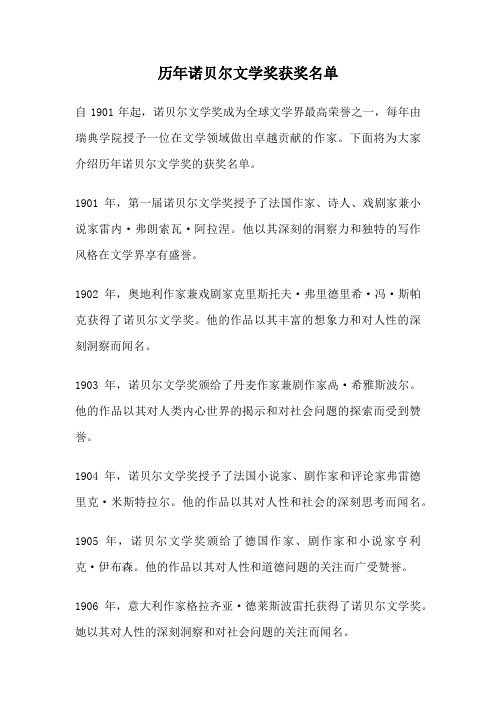
历年诺贝尔文学奖获奖名单自1901年起,诺贝尔文学奖成为全球文学界最高荣誉之一,每年由瑞典学院授予一位在文学领域做出卓越贡献的作家。
下面将为大家介绍历年诺贝尔文学奖的获奖名单。
1901年,第一届诺贝尔文学奖授予了法国作家、诗人、戏剧家兼小说家雷内·弗朗索瓦·阿拉涅。
他以其深刻的洞察力和独特的写作风格在文学界享有盛誉。
1902年,奥地利作家兼戏剧家克里斯托夫·弗里德里希·冯·斯帕克获得了诺贝尔文学奖。
他的作品以其丰富的想象力和对人性的深刻洞察而闻名。
1903年,诺贝尔文学奖颁给了丹麦作家兼剧作家卨·希雅斯波尔。
他的作品以其对人类内心世界的揭示和对社会问题的探索而受到赞誉。
1904年,诺贝尔文学奖授予了法国小说家、剧作家和评论家弗雷德里克·米斯特拉尔。
他的作品以其对人性和社会的深刻思考而闻名。
1905年,诺贝尔文学奖颁给了德国作家、剧作家和小说家亨利克·伊布森。
他的作品以其对人性和道德问题的关注而广受赞誉。
1906年,意大利作家格拉齐亚·德莱斯波雷托获得了诺贝尔文学奖。
她以其对人性的深刻洞察和对社会问题的关注而闻名。
1907年,诺贝尔文学奖授予了英国作家卡尔·斯皮特。
他的作品以其对人类内心世界的深入剖析和对社会问题的批判而受到赞誉。
1908年,瑞典作家鲁特维克·比约尔纳松获得了诺贝尔文学奖。
他的作品以其对人性和社会的深入思考而闻名。
1909年,诺贝尔文学奖颁给了奥地利诗人和剧作家卨·霍夫曼斯塔尔。
他的作品以其对人类内心的揭示和对人性的探索而受到赞誉。
1910年,诺贝尔文学奖授予了瑞典作家卨·保尔·约翰·鲁特斯特朗。
他的作品以其对人性和社会的深入思考而广受赞誉。
1911年,意大利作家莫里斯·马特奥利获得了诺贝尔文学奖。
他以其对人类内心世界的揭示和对社会问题的关注而受到赞誉。
走进百年诺贝尔文学奖讲座稿
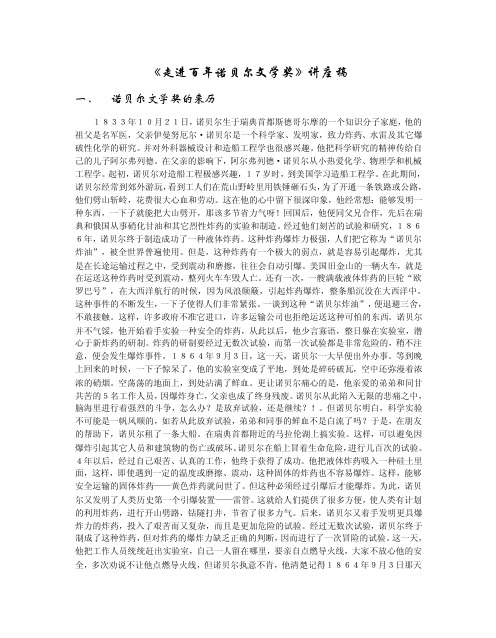
《走进百年诺贝尔文学奖》讲座稿一、诺贝尔文学奖的来历1833年10月21日,诺贝尔生于瑞典首都斯德哥尔摩的一个知识分子家庭,他的祖父是名军医,父亲伊曼努厄尔·诺贝尔是一个科学家、发明家,致力炸药、水雷及其它爆破性化学的研究。
并对外科器械设计和造船工程学也很感兴趣。
他把科学研究的精神传给自己的儿子阿尔弗列德。
在父亲的影响下,阿尔弗列德·诺贝尔从小热爱化学、物理学和机械工程学。
起初,诺贝尔对造船工程极感兴趣,17岁时,到美国学习造船工程学。
在此期间,诺贝尔经常到郊外游玩,看到工人们在荒山野岭里用铁锤砸石头,为了开通一条铁路或公路,他们劈山斩岭,花费很大心血和劳动。
这在他的心中留下很深印象,他经常想:能够发明一种东西,一下子就能把大山劈开,那该多节省力气呀!回国后,他便同父兄合作,先后在瑞典和俄国从事硝化甘油和其它烈性炸药的实验和制造。
经过他们刻苦的试验和研究,1866年,诺贝尔终于制造成功了一种液体炸药。
这种炸药爆炸力极强,人们把它称为“诺贝尔炸油”,被全世界普遍使用。
但是,这种炸药有一个极大的弱点,就是容易引起爆炸,尤其是在长途运输过程之中,受到震动和磨擦,往往会自动引爆。
美国旧金山的一辆火车,就是在运送这种炸药时受到震动,整列火车车毁人亡。
还有一次,一艘满载液体炸药的巨轮“欧罗巴号”,在大西洋航行的时候,因为风浪颠簸,引起炸药爆炸,整条船沉没在大西洋中。
这种事件的不断发生,一下子使得人们非常紧张。
一谈到这种“诺贝尔炸油”,便退避三舍,不敢接触。
这样,许多政府不准它进口,许多运输公司也拒绝运送这种可怕的东西。
诺贝尔并不气馁,他开始着手实验一种安全的炸药,从此以后,他少言寡语,整日躲在实验室,潜心于新炸药的研制。
炸药的研制要经过无数次试验,而第一次试验都是非常危险的,稍不注意,便会发生爆炸事件。
1864年9月3日,这一天,诺贝尔一大早便出外办事。
等到晚上回来的时候,一下子惊呆了,他的实验室变成了平地,到处是碎砖破瓦,空中还弥漫着浓浓的硝烟。
诺贝尔文学奖历年名单及作品

诺贝尔文学奖历年名单及作品近代现代文学史上,诺贝尔文学奖是最具权威性和最高荣誉的文学奖项。
它可以客观地反映出欧美文学史上最具影响力、最有创意性和最伟大的文学作品,代表着当代乃至整个历史进程中文学创作的思想内容和文学见解,被认为是一种文学景观的领军人物。
本文将以诺贝尔文学奖历年名单及作品为主题,简单介绍历届获奖者的作品,回顾文学史上伟大的创作。
1901年,第一届诺贝尔文学奖由瑞典诗人博尔赫斯获得。
他的作品被称为“古典主义与浪漫主义文学的和谐统一”,他的诗歌、戏剧和抒情文学作品都极为出色,赢得了众人的称赞。
他的代表作《拉斯克》,描绘了在年春天瑞典的山水风光,唤起神灵的力量,以及追求自由的思想,隐喻着男女之间的美丽爱情。
1909年,第二届诺贝尔文学奖被授予了美国作家、诗人托尔斯泰。
他的诗歌大多恢弘而又抒情,充满了神话、历史和地理的元素,描绘出英雄斗争的美丽场景。
他最著名的诗歌《安娜卡列宁》记录了乌克兰革命家安娜卡列宁抗争暴政的传奇故事,反映了现实社会和爱国精神,托尔斯泰借此诗歌为新时期寻求民族自由和平等权利而斗争的人民奠定了坚实的基础。
1913年,第三届诺贝尔文学奖授予给美国短篇小说家和诗人米克尔斯比。
他的作品多为短篇小说,以爱尔兰民俗元素为主,细腻地构筑了反映爱尔兰背景的文学空间。
他的小说《唐纳尔》讲述了一位贫寒的唐纳尔受封为贵族的故事,抒发了他对类似爱尔兰自由人民的不满,在他的笔下,文学变成了有动力的改变社会的景观。
1917年,第四届诺贝尔文学奖由英国诗人及作家维克多雨果获得。
他的诗歌细腻、深刻、抒情、充满传奇色彩,被认为是“唯美主义诗歌的最高成就”。
他的传世之作《神曲》,描述的是神的创造与人类的救赎,把神灵和现实景物结合,把高尚的思想和华丽的文学融合在一起,表现出几乎完美的审美感受。
1919年,第五届诺贝尔文学奖授予瑞典作家斯蒂芬索尔克。
他的小说多次被认为是文学史上最伟大的小说之一,他最著名的小说《叛逆的鲁路修》,描绘了一个叛逆青年对社会权威的抗争,反映了男主人公叛逆心理与传统观念的斗争,以及逃避权威的冲动,展示出英雄的英勇性格,具有极强的感召力。
历届诺贝尔文学奖获奖作品

历届诺贝尔文学奖获奖作品
诺贝尔文学奖是世界文学领域的最高荣誉之一,自1901年设立以来,已经颁发了117次。
本文将介绍历届诺贝尔文学奖获奖作品。
1901年首届诺贝尔文学奖颁给了法国作家萨尔玛格妮,他的代表作品有《铁道员》、《诺克斯庄园的女主人》等。
1913年,卢森堡作家莫泊桑成为第一位获得诺贝尔文学奖的短篇小说家,他的代表作品有《特别的一天》、《爱丽丝》等。
1922年,爱尔兰作家乔伊斯荣获诺贝尔文学奖,代表作品为《尤利西斯》。
1949年,美国作家威廉·福克纳获得诺贝尔文学奖,他的代表作品有《荒野之声》、《喧哗与骚动》等。
1954年,法国作家莫里斯·马特林获奖,代表作品为《莫里哀小姐的爱情历险记》、《魔笛》等。
1962年,哥伦比亚作家马尔克斯获得诺贝尔文学奖,代表作品为《百年孤独》、《霍乱时期的爱情》等。
1982年,加勒比作家瓦尔科特获得诺贝尔文学奖,代表作品为《广场》、《夜晚的骑士》等。
2003年,南非作家库慕·纳迪·贝特获奖,代表作品为《草原之歌》、《我和尼尔逊·曼德拉》等。
2013年,加拿大作家爱丽丝·门罗成为获得诺贝尔文学奖的第13位女性作家,代表作品为《我身后的人》、《她们的父亲》等。
以上是部分历届诺贝尔文学奖获奖作品,这些作品承载了世界各地作家的思想、情感和文化遗产,对世界文学的发展做出了重要贡献。
诺贝尔文学奖历年名单及作品清单
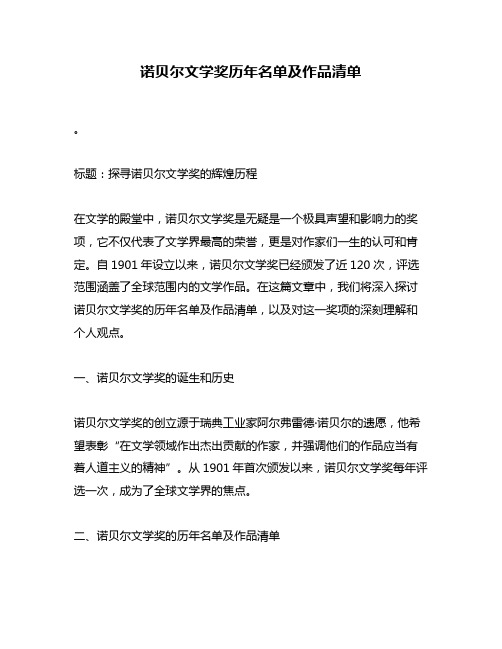
诺贝尔文学奖历年名单及作品清单。
标题:探寻诺贝尔文学奖的辉煌历程在文学的殿堂中,诺贝尔文学奖是无疑是一个极具声望和影响力的奖项,它不仅代表了文学界最高的荣誉,更是对作家们一生的认可和肯定。
自1901年设立以来,诺贝尔文学奖已经颁发了近120次,评选范围涵盖了全球范围内的文学作品。
在这篇文章中,我们将深入探讨诺贝尔文学奖的历年名单及作品清单,以及对这一奖项的深刻理解和个人观点。
一、诺贝尔文学奖的诞生和历史诺贝尔文学奖的创立源于瑞典工业家阿尔弗雷德·诺贝尔的遗愿,他希望表彰“在文学领域作出杰出贡献的作家,并强调他们的作品应当有着人道主义的精神”。
从1901年首次颁发以来,诺贝尔文学奖每年评选一次,成为了全球文学界的焦点。
二、诺贝尔文学奖的历年名单及作品清单(这里需要列出诺贝尔文学奖历年的获奖者名单和其代表作品,可以按年份顺序逐个展开,确保全面覆盖所有的获奖者和代表作品。
这里需要重点展示每一位获奖作家的文学成就和其作品的价值,帮助读者更好地了解每一位获奖者的贡献和成就。
)三、个人观点和理解对于诺贝尔文学奖,我个人认为,这不仅是一种奖励,更是对文学界的一次鞭策和激励。
获得诺贝尔文学奖的作家,他们的作品往往具有超越时代背景的普世价值,能够触及人类内心最深处的情感和思想。
他们的作品往往承载着对人性、社会、历史和文化的思考,具有深刻的启发和感染力。
诺贝尔文学奖也是一个世界性的平台,通过这一奖项,不同国家和地区的文学交流得以加强,有助于推动文学的多元发展和交流。
总结:通过对诺贝尔文学奖的历年名单及作品清单的全面解读和个人观点的分享,我们不仅对文学奖项有了更深入的认识,更能够从中感受到文学的力量和魅力。
诺贝尔文学奖的辉煌历程,激励和鼓舞着一代又一代的读者和作家,带给世界无尽的文学情感和思想的交融。
让我们共同探寻诺贝尔文学奖的辉煌历程,去感受文学的深度与广度,让我们共同追寻文学的光芒与魅力。
(文章结束)以上就是对指定主题的文章撰写,希望对你有所帮助。
历届诺贝尔文学奖得主及其颁奖词

历届诺贝尔⽂学奖得主及其颁奖词历届诺贝尔⽂学奖得主及其颁奖词诺贝尔⽂学奖简介诺贝尔⽂学奖,是阿尔弗雷德·诺贝尔设⽴的诺贝尔奖中的⼀个奖项。
诺贝尔在遗嘱中说奖⾦的⼀部分应该“奖给在⽂学界创作出具有理想倾向的最佳作品的⼈”。
诺贝尔⽂学奖由瑞典⽂学院颁奖。
1900年代1901年苏利·普吕多姆(法国诗⼈)《孤独与深思》是⾼尚的理想、完美的艺术和罕有的⼼灵与智慧的实证1902年特奥多尔·蒙森(德国历史学家)《罗马风云》今世最伟⼤的纂史巨匠,此点于其巨著《罗马史》中表露⽆疑1903年⽐昂斯滕·⽐昂松,挪威戏剧家、诗⼈、⼩说家《挑战的⼿套》他以诗⼈鲜活的灵感和难得的⾚⼦之⼼,把作品写得雍容、华丽⽽⼜缤纷1904年弗雷德⾥克·⽶斯塔尔,法国诗⼈《⾦岛》他的诗作蕴涵之清新创造性与真正的感召⼒,它忠实地反映了他民族的质朴精神何塞·埃切加赖,西班⽛戏剧家、诗⼈《伟⼤的牵线⼈》由于它那独特和原始风格的丰富⼜杰出,作品恢复了西班⽛喜剧的伟⼤传统1905年亨利克·显克维⽀,波兰⼩说家《第三个⼥⼈》由于他在历史⼩说写作上的卓越成就1906年乔祖埃·卡尔杜齐,意⼤利诗⼈、⽂艺批评家《青春诗》不仅是由于他精深的学识和批判性的研究,更重要是为了颂扬他诗歌杰作中所具有的特⾊、创作⽓势,清新的风格和抒情的魅⼒1907年约瑟夫·鲁德亚德·吉⼘林,英国⼩说家、诗⼈《⽼虎!⽼虎!》这位世界名作家的作品以观察⼊微、想象独特、⽓概雄浑、叙述卓越见长1908年鲁道尔夫·欧肯,德国哲学家《精神⽣活漫笔》他对真理的热切追求、他对思想的贯通能⼒、他⼴阔的观察,以及他在⽆数作品中,辩解并阐释⼀种理想主义的⼈⽣哲学时,所流露的热诚与⼒量1909年西尔玛·拉格洛夫,瑞典作家《骑鹅旅⾏记》由于她作品中特有的⾼贵的理想主义、丰富的想象⼒、平易⽽优美的风格[编辑]1910年代1910年保尔·约翰·路德维希·冯·海塞,德国作家《特雷庇姑娘》表扬这位抒情诗⼈、戏剧家、⼩说家以及举世闻名的短篇⼩说家,在他漫长⽽多产的创作⽣涯中,所达到的充满理想主义精神之艺术⾄境1911年莫⾥斯·梅特林克,⽐利时剧作家、诗⼈、散⽂家《花的智慧》由于他在⽂学上多⽅⾯的表现,尤其是戏剧作品,不但想象丰富,充满诗意的奇想,有时虽以神话的⾯貌出现,还是处处充满了深刻的启⽰。
所有诺贝尔文学奖全部获奖作品

所有诺贝尔文学奖全部获奖作品百年诺贝尔文学奖得主,个个都是大咖:加缪、海明威、马尔克斯、川端康成、莫言、石黑一雄……他们是知识分子、文艺青年“一生必读清单”的头号人选。
小编整理了所有诺贝尔文学奖全部获奖作品,欢迎借鉴参考。
2021诺贝尔奖获得者名单诺贝尔奖为什么没有数学奖诺贝尔奖有哪些奖项1901-2021诺贝尔文学奖全部获奖作品:2004年-2021年2021年得主:坦桑尼亚作家Abdulrazak Gurnah(阿卜杜勒拉扎克·古尔纳获)代表作:《天堂》、《在海边》、《来世》获奖理由:因为他对殖民主义的影响,以及对难民在文化和大陆之间的鸿沟中的命运毫不妥协和富有同情心的洞察。
”2020年得主:露易丝·格丽克作品代表作:《直到世界反映了灵魂最深层的需要》、《月光的合金》获奖理由:以带有朴素美感、准确无疑的诗歌语言将个人的存在普遍化。
2019年2019年瑞典文学院颁发了两届诺贝尔文学奖的获得者,获奖者分别为:波兰女作家Olga Tokarczuk(奥尔嘉·朵卡萩)、奥地利作者Peter Handke(彼得·汉德克)。
奥尔嘉·朵卡萩代表作:《镜子里的城市》、《书中人物旅行记》、《太古和其他的时间》、《白天的房子夜晚的房子》彼得·汉德克代表作:《卡斯帕》、剧本《骂观众》、小说《痛苦的中国人》《守门员对点球的焦虑》和维姆·文德斯电影《歧路》、《柏林苍穹下》2018年瑞典文学院因卷入性丑闻等事件陷入信任危机,取消颁发2018年诺贝尔文学奖。
2017年得主:石黑一雄代表作:《群山淡景》、《浮世画家》、《长日将尽》获奖理由:他的小说带有强大的情感力量,揭开了我们与世界连接的虚幻的深渊。
2016年得主:鲍勃·迪伦代表作:《随风飘荡》获奖理由:用美国传统歌曲创造了新的诗意表达。
2015年得主:斯韦特兰娜·阿列克谢耶维奇(女)代表作:《切尔诺贝利的回忆:核灾难口述史》获奖理由:多样声音的作品,一座记录我们时代的苦难和勇气的纪念碑。
2012年至2023年诺贝尔文学奖获奖作品

2012年至2023年诺贝尔文学奖获奖作品1. 概述2012年至2023年,诺贝尔文学奖陆续颁发,每一部获奖作品都成为文学界的焦点,引发广泛的关注和讨论。
诺贝尔文学奖作为世界上最高荣誉的文学奖项,所获得的获奖作品必然具有卓越的文学价值和影响力。
本文将从2012年至2023年的诺贝尔文学奖获奖作品着手,进行一次综合的回顾和评述。
2. 2012年获奖作品2012年,我国作家莫言荣获诺贝尔文学奖,他的作品以《红高粱家族》、《丰乳肥臀》等作品享誉文坛。
莫言以其对我国乡土文化的深刻刻画和对人性的深沉探索而获得了诺贝尔文学奖,他的作品影响着世界范围内的读者,展现了我国文学的魅力。
3. 2013年获奖作品2013年,加拿大作家阿丽丝·门罗获得诺贝尔文学奖,她以其短篇小说作品著称于世,作品充满了对人性的细腻观察和对生活的深刻反思。
阿丽丝·门罗的文学风格独特、情感真挚,她的作品被誉为“普通生活的奇迹”,深受全球读者欢迎。
4. 2014年获奖作品2014年,法国作家帕特里克·莫迪亚诺获得诺贝尔文学奖,他以其反乌托邦小说作品而闻名。
帕特里克·莫迪亚诺的作品充满了对社会现实的思考和对人类命运的关怀,他的创作风格抠人心弦,引领着文学潮流,成为世界文学的重要代表。
5. 2015年获奖作品2015年,白俄罗斯作家斯韦特兰娜·阿列克西耶维奇获得诺贝尔文学奖,她的作品以其深刻的历史描绘和对人道主义的追求而备受赞誉。
斯韦特兰娜·阿列克西耶维奇的文学作品具有强烈的社会关怀色彩,深刻揭示了战争与人性的关系。
6. 2016年获奖作品2016年,美国歌德文学奖(Goethe Prize)获得者鲍勃·迪伦成为诺贝尔文学奖的获得者,他以其独特的诗歌和音乐创作而享誉世界。
迪伦的作品充满了对时代变迁和社会现实的反思,他的音乐和歌词深深影响了全球的音乐文化和文学创作。
7. 2017年获奖作品2017年,日本作家村上春树荣获诺贝尔文学奖,他的作品以其跨文化的审视和对生命、命运的深刻思考而备受推崇。
世纪辉煌 百年回眸:——纪念诺贝奖颁奖100周年学术研讨会综述

科学精神 , 要提倡 创新精 神。弘扬科 学精 神 , 二是 要求我 们 克服种种不 良学风 , 消除学术腐败 以科学 的态度 、 实的态 求 度去从事科学研究 。弘扬科学精 神 、 还要求我们坚持不懈 地
武汉大学哲学系童鹰教授在题为《 论诺 贝尔的科 技企 业 家精 神》 的报告 中认 为 , 贝尔 本人就是 近现代 科学技术 史 诺 上最具范式意义的科技创业家 . 他身上鲜明地体现着 科 在 技创新精神 、 科技开 发精 神和科 技奉 献精神 为三要素的科技 企业家精神 。科拄创 新精神 包括创新 思维 和创新 实验 。安 全炸药的发 明就是创新思维和创新 实验 交互作用 的结果 , 而 非 偶然 的发现 和发明 。科 技开发 精神是 科技企业 家所 具有 的善于把 自己的科学 发现 和技 术发 明 尽快实 现专 利 、 品 商
理而献身的精神。这些 都是我 们在人才 培养过 程 中要特 别
加强 的。当前我们需要 的不是去大加炒作“ 中国人何 时能获 得诺贝尔奖 , 而是脚踏 实地 的工作 . 一代代努力下 去, 诺皿尔
奖将会不期而遇” =
复旦大学 哲学系孙承 叔教授在 他与陈其 荣教 授 的合作 报告《 贝尔奖 : 诺 现代科 学技 术的光辉 历程》 中指 出, 贝尔 诺 奖百 年的光辉业 绩主导 了 2 0世纪科技 创新 的总体格 局 , 突 现了科学的求实创新精神 , 示了当代科学技 术发展在交叉 展 融合 、 从个体研究 向群体研 究 、 从基 础科学 与应用 技术密 切 结合 的基本趋 势。我们要在 2 l世纪实现 中华 民族 的伟 大复 兴, 必须准确把握 当代 科学技 术发 展的基本 趋势 , 力弘扬 大 科学精 神 , 塑造“ 新共 同体” 培养 大批具 有创新 意识 和创 创 ,
历届诺贝尔文学奖得主以及原因作品

历届诺贝尔文学奖得主以及原因作品自1901年设立诺贝尔文学奖以来,已经有许多杰出的作家荣获了这一殊荣。
以下是一些历届诺贝尔文学奖得主以及他们获奖的原因和作品的简要介绍。
1.塞缪尔·贝克特(1969年):贝克特是20世纪最伟大的戏剧家之一,他的作品以独特的风格和语言著称。
他最著名的作品是《等待戈多》和《忒修斯之船》,这两部作品都展示了他对人性和存在的思考。
2.加布里埃尔·加西亚·马尔克斯(1982年):马尔克斯是拉丁美洲文学的代表性作家之一,他的魔幻现实主义作品深受世界读者的喜爱。
他最著名的作品是《百年孤独》和《霍乱时期的爱情》,这两部作品被认为是现代文学的经典之作。
3.渡边淳一(1994年):渡边是日本著名的小说家,以其细腻的描写和对人性的深刻洞察力而著名。
他最著名的作品是《红》和《权力的游戏》,这两部作品讲述了战争和人性的复杂关系。
4.寄藤树立(2024年):寄藤是韩国的作家,他的作品通常探讨家庭、性别和权力等社会议题。
他最著名的作品是《请你不要浪费你的时间》和《最后一个疯子与他的闻耳男子》,这两部作品都以其独特的叙述方式和深入的情感描写而闻名。
5.刘震云(2024年):刘震云是中国著名的作家和编剧,他的作品主要关注中国社会的变革和人性的复杂性。
他最著名的作品是《一地鸡毛》和《幸福的飘浮》,这两部作品以其生动的描写和对人性的深入剖析而受到了广大读者的喜爱。
以上只是历届诺贝尔文学奖得主中的几位,他们的作品涵盖了各种题材和风格,但都在不同程度上提供了对人类经验和人性的深入思考。
通过他们的作品,读者可以更好地理解这个世界以及我们自己。
诺贝尔文学奖的设立不仅是对这些作家个人成就的认可,也是对文学艺术的鼓励和推动。
这个奖项每年都吸引了世界各地的作家和文学爱好者的关注,成为了全球文学界备受瞩目的奖项之一。
百年诺贝尔文学奖得主和作品一览(英文)

The Nobel Prize in Literature 2013 Alice Munro"master of the contemporary short story"The Nobel Prize in Literature 2012 Mo Yan"who with hallucinatory realism merges folk tales, history and the contemporary"The Nobel Prize in Literature 2011 Tomas Tranströmer"because, through his condensed, translucent images, he gives us fresh access to reality" Nobel Prize in Literature (1901 - 2010) /library/bl-bio/bl-nobel.htm?p=1∙1901 - Sully Prudhomme1 (1837-1907)French writer. Original name Rene Francois Armand Prudhomme. French writer.Sully Prudhomme won the first Nobel Prize for Literature in 1901 "in specialrecognition of his poetic composition, which gives evidence of lofty idealism,artistic perfection and a rare combination of the qualities of both heart andintellect."∙1902 - Christian Matthias Theodor Mommsen2 (1817-1903)German/Nordic writer. Christian Matthias Theodor Mommsen was referred to as "the greatest living master of the art of historical writing, with special reference to his monumental work, A history of Rome" when he received the Nobel Prize inLiterature in 1902.∙1903 - Bjørnstjerne Martinus Bjørnson3 (1832-1910)Norwegian writer. Bjørnstjerne Martinus Bjørnson received the Nobel Prize inLiterature in 1903 "as a tribute to his noble, magnificent and versatile poetry,which has always been distinguished by both the freshness of its inspiration andthe rare purity of its spirit."∙1904 (2 winners) - Frédéric Mistral4 (1830-1914)French writer. Besides many short poems, Frédéric Mistral wrote four verseromances. He also published a Provençal dictionary and wrote memoirs. Hereceived the 1904 Nobel Prize in Literature: "in recognition of the freshoriginality and true inspiration of his poetic production, which faithfully reflectsthe natural scenery and native spirit of his people, and, in addition, his significant work as a Provençal philologist."∙1904 (2 winners) - José Echegaray Y Eizaguirre5 (1832-1916)Spanish writer. José Echegaray Y Eizaguirre received the 1904 Nobel Prize inLiterature "in recognition of the numerous and brilliant compositions which, in an individual and original manner, have revived the great traditions of the Spanishdrama."∙1905 - Henryk Sienkiewicz6 (1846-1916)Polish writer. Henryk Sienkiewicz was awarded the 1905 Nobel Prize inLiterature "because of his outstanding merits as an epic writer." Probably his most widely translated work is Quo Vadis? (1896), a study of Roman society in the time of the Emperor Nero.∙1906Giosuè Carducci7 (1835-1907)Italian writer. Professor of literature at the Univ. of Bologna from 1860 to 1904, Giosuè Carducci was a scholar, editor, orator, critic, and patriot. He was awarded the 1906 Nobel Prize in literature "not only in consideration of his deep learning and critical research, but above all as a tribute to the creative energy, freshness of style, and lyrical force which characterize his poetic masterpieces."∙1907 - Rudyard Kipling8 (1865-1936)British writer. Rudyard Kipling wrote novels, poems and short stories--mostly set in India and Burma (now known as Myanmar). He was the 1907 Nobel PrizeLaureate in Literature "in consideration of the power of observation, originality of imagination, virility of ideas and remarkable talent for narration whichcharacterize the creations of this world-famous author."∙1908 - Rudolf Christoph Eucken9 (1846-1926)German writer. Rudolf Christoph Eucken received the 1908 Nobel Prize inLiterature "in recognition of his earnest search for truth, his penetrating power of thought, his wide range of vision, and the warmth and strength in presentation with which in his numerous works he has vindicated and developed an idealistic philosophy of life."∙1909 - Selma Ottilia Lovisa Lagerlöf10 (1858-1940)Swedish writer. Selma Ottilia Lovisa Lagerlöf turned away from the literaryrealism and wrote in a romantic and imaginative manner, vividly evoking thepeasant life and landscape of Northern Sweden. She received the 1909 NobelPrize in Literature "in appreciation of the lofty idealism, vivid imagination and spiritual perception that characterize her writings."∙1910 - Paul Johann Ludwig Heyse11 (1830-1914)German writer. Paul Johann Ludwig von Heyse was a German novelist, poet, and dramatist. He received the 1910 Nobel Prize in Literature "as a tribute to theconsummate artistry, permeated with idealism, which he has demonstrated during his long productive career as a lyric poet, dramatist, novelist and writer of world-renowned short stories."∙1911 - Count Maurice (Mooris) Polidore Marie Bernhard Maeterlinck12 (1862-1949)Belgian writer. Maurice Maeterlinck developed his strongly mystical ideas in a number of prose works, among them Le Trésor des humbles (1896) [The Treasure of the Humble], La Sagesse et la destinée (1898) [Wisdom and Destiny], and Le Temple enseveli (1902) [The Buried Temple]. He received the 1911 Nobel Prize in Literature "in appreciation of his many-sided literary activities, and especially of his dramatic works, which are distinguished by a wealth of imagination and bya poetic fancy, which reveals, sometimes in the guise of a fairy tale, a deepinspiration, while in a mysterious way they appeal to the readers' own feelings and stimulate their imaginations."∙1912 - Gerhart Johann Robert Hauptmann13 (1862-1946)German writer. Gerhart Johann Robert Hauptmann received the 1912 Nobel Prize in Literature "primarily in recognition of his fruitful, varied and outstandingproduction in the realm of dramatic art."∙1913 - Rabindranath Tagore14 (1861-1941)Indian writer. Rabindranath Tagore was awarded the 1913 Nobel Prize inLiterature "because of his profoundly sensitive, fresh and beautiful verse, bywhich, with comsummate skill, he has made his poetic thought, expressed in his own English words, a part of the literature of the West." In 1915, he was knighted by the British King George V. Tagore renounced his knighthood in 1919following the Amritsar massacre or nearly 400 Indian demonstrators.∙1914 - The prize money was allocated to the Special Fund of this prize section.∙1915 - Romain Rolland15 (1866-1944)French writer. Rolland's most famous work is Jean Christophe, a partlyautobiographical novel, which also won him the 1915 Nobel Prize in Literature.He also received the prize "as a tribute to the lofty idealism of his literaryproduction and to the sympathy and love of truth with which he has described different types of human beings."∙1916 - Carl Gustaf Verner von Heidenstam16 (1859-1940)Swedish writer. Received the 1916 Nobel Prize for Literature "in recognition of his significance as the leading representative of a new era in our literature."∙1917 - Karl Adolph Gjellerup17 (1857-1919)Danish writer. Received the 1917 Nobel Prize for Literature "for his varied and rich poetry, which is inspired by lofty ideals."Henrik Pontoppidan18 (1857-1943)Danish writer. Received the 1917 Nobel Prize for Literature "for his authentic descriptions of present-day life in Denmark."∙1918 - The prize money was allocated to the Special Fund of this prize section.∙1919 - Carl Friedrich Georg Spitteler19 (1845-1924)Swiss writer. Received the 1919 Nobel Prize for Literature "in specialappreciation of his epic, Olympian Spring."∙1920 - Knut Pedersen Hamsun20 (1859-1952)Norwegian writer. Received the 1920 Nobel Prize for Literature "for hismonumental work, Growth of the Soil."∙1921 - Anatole France21 (1844-1924)French writer. Pseudonym for Jacques Anatole Francois Thibault. He is often thought of as the greatest French writer of the late 19th and early 20th centuries.Awarded the Nobel Prize for Literature in 1921 "in recognition of his brilliant literary achievements, characterized as they are by a nobility of style, a profound human sympathy, grace, and a true Gallic temperament."∙1922 - Jacinto Benavente22 (1866-1954)Spanish writer. Received the 1922 Nobel Prize in Literature "for the happymanner in which he has continued the illustrious traditions of the Spanish drama."∙1923 - William Butler Yeats23 (1865-1939)Irish writer. He received the 1923 Nobel Prize for Literature "for his alwaysinspired poetry, which in a highly artistic form gives expression to the spirit of a whole nation."∙1924 - Wladyslaw Stanislaw Reymont24 (1868-1925)Polish writer. Received the 1924 Nobel Prize for Literature "for his great national epic, The Peasants."∙1925 - George Bernard Shaw25 (1856-1950)British/Irish writer. This Irish-born writer is considered the most significantBritish dramatist since Shakespeare. He was a playwright, essayist, politicalactivist, lecturer, novelist, philosopher, revolutionary evolutionist, and mostprolific letter writer in literary history. Received the 1925 Nobel Prize "for his work which is marked by both idealism and humanity, its stimulating satire often being infused with a singular poetic beauty."∙1926 - Grazia Deledda26 (1871-1936)Pseudonym for Grazia Madesani née DeleddaItalian writer. Received the 1926 Nobel Prize for Literature "for her idealistically inspired writings which with plastic clarity picture the life on her native island and with depth and sympathy deal with human problems in general."∙1927 - Henri Bergson27 (1859-1941)French writer. Received the 1927 Nobel Prize for Literature "in recognition of his rich and vitalizing ideas and the brilliant skill with which they have beenpresented."∙1928 - Sigrid Undset (1882-1949)Norwegian writer. Received the 1928 Nobel Prize for Literature "principal for her powerful descriptions of Northern life during the Middle Ages."∙1929 - Thomas Mann28 (1875-1955)German writer. Winner of the 1929 Nobel Laureate in Literature "principally for his great novel, Buddenbrooks, which has won steadily increased recognition as one of the classic works of contemporary literature."∙1930 - Sinclair Lewis29 (1885-1951)American writer. Received the 1930 Nobel Prize for Literature "for his vigorous and graphic art of description and his ability to create, with wit and humor, new types of characters."∙1931 - Erik Axel Karlfeldt (1864-1931)Swedish writer. Received the Nobel Prize for his poetic body of work.∙1932 - John Galsworthy (1867-1933)British writer. Received the 1932 Nobel Prize for Literature "for his distinguished art of narration which takes its highest form in The Forsyte Saga."∙1933 - Ivan Alekseyevich Bunin (1870-1953)Russian writer. Received the 1933 Nobel Prize in Literature "for the strict artistry with which he has carried on the classical Russian traditions in prose writing."∙1934 - Luigi Pirandello (1867-1936)Italian writer. Received the 1934 Nobel Prize in Literature "for his bold andingenious revival of dramatic and scenic art."∙1935 - The prize money was with 1/3 allocated to the Main Fund and with 2/3 to the Special Fund of this prize section.∙1936 - Eugene Gladstone O'Neill30 (1888-1953)American writer. Eugene (Gladstone) O'Neill won the Nobel Prize for Literature in 1936, and Pulitzer Prizes for four of his plays: Beyond the Horizon (1920);Anna Christie (1922); Strange Interlude (1928); and Long Day's Journey IntoNight (1957). He won the Nobel Prize in Literature "for the power, honesty and deep-felt emotions of his dramatic works, which embody an original concept of tragedy."∙1937 - Roger Martin du Gard31 (1881-1958)French writer. Received the 1937 Nobel Prize for Literature "for the artistic power and truth with which he has depicted human conflict as well as some fundamental aspects of contemporary life in his novel-cycle Les Thibault."∙1938 - Pearl Buck (1892-1973)Pseudonym for Pearl Walsh née Sydenstricker.American writer. Received the 1938 Nobel Prize in Literature "for her rich and truly epic descriptions of peasant life in China and for her biographicalmasterpieces."∙1939 - Frans Eemil Sillanpää (1888-1964)Finnish writer. Received the 1939 Nobel Prize in Literature "for his deepunderstanding of his country's peasantry and the exquisite art with which he has portrayed their way of life and their relationship with Nature."∙1940 - The prize money was with 1/3 allocated to the Main Fund and with 2/3 to the Special Fund of this prize section.∙1941 - The prize money was with 1/3 allocated to the Main Fund and with 2/3 to the Special Fund of this prize section.∙1942 - The prize money was with 1/3 allocated to the Main Fund and with 2/3 to the Special Fund of this prize section.∙1943 - The prize money was with 1/3 allocated to the Main Fund and with 2/3 to the Special Fund of this prize section.∙1944 - Johannes Vilhelm Jensen (1873-1950)Danish writer. Received the 1944 Nobel Prize in Literature "for the rare strength and fertility of his poetic imagination with which is combined an intellectualcuriosity of wide scope and a bold, freshly creative style."∙1945 - Gabriela Mistral32 (1830-1914)Pseudonym for Lucila Godoy Y Alcayaga.Chilean writer. Received the 1945 Nobel Prize in Literature "for her lyric poetry which, inspired by powerful emotions, has made her name a symbol of theidealistic aspirations of the entire Latin American world."∙1946 - Hermann Hesse33 (1877-1962)German/Swiss writer. By 1946, he received the Nobel Prize in Literature "for his inspired writings which, while growing in boldness and penetration, exemplify the classical humanitarian ideals and high qualities of style."∙1947 - André Paul Guillaume Gide (1869-1951)French writer. Received the 1947 Nobel Prize in Literature "for hiscomprehensive and artistically significant writings, in which human problems and conditions have been presented with a fearless love of truth and keenpsychological insight."∙1948 - Thomas Stearns Eliot34 (1888-1965)British/American writer. Received the 1948 Nobel Prize in Literature "for hisoutstanding, pioneer contribution to present-day poetry."∙1949 - William Faulkner35 (1897-1962)American writer. Received the 1949 Nobel in Literature "for his powerful and artistically unique contribution to the modern American novel."∙1950 - Earl (Bertrand Arthur William) Russell (1872-1970)British writer. Received the 1950 Nobel in Literature "in recognition of his varied and significant writings in which he champions humanitarian ideals and freedom of thought."∙1951 - Pär Fabian Lagerkvist (1891-1974)Swedish writer. Received the 1951 Nobel in Literature "for the artistic vigor and true independence of mind with which he endeavors in his poetry to find answers to the eternal questions confronting mankind."∙1952 - François Mauriac36 (1885-1970)French writer. Received the 1952 Nobel in Literature "for the deep spiritualinsight and the artistic intensity with which he has in his novels penetrated the drama of human life."∙1953 - Sir Winston Leonard Spencer Churchill (1874-1965)British writer. Received the 1953 Nobel in Literature "for his mastery of historical and biographical description as well as for brilliant oratory in defending exalted human values."∙1954 - Ernest Miller Hemingway37 (1899-1961)American writer. Brevity was his specialty. Received the 1954 Nobel in Literature "for his mastery of the art of narrative, most recently demonstrated in The Old Man and the Sea, and for the influence that he has exerted on contemporary style"∙1955 - Halldór Kiljan Laxness (1902-1998)Icelandic writer. Received the 1955 Nobel in Literature "for his vivid epic power which has renewed the great narrative art of Iceland."∙1956 - Juan Ramón Jiménez (1881-1958)Spanish writer. Received the 1956 Nobel in Literature "for his lyrical poetry,which in Spanish language constitutes an example of high spirit and artisticpurity."∙1957 - Albert Camus38 (1913-1960)French writer. He was a famous existentialist and author of "The Plague" and"The Stranger." He received the Nobel Prize in Literature "for his importantliterary production, which with clear-sighted earnestness illuminates the problems of the human conscience in our times."∙1958 - Boris Leonidovich Pasternak39 (1890-1960)Russian writer. Received the 1958 Nobel in Literature "for his importantachievement both in contemporary lyrical poetry and in the field of the greatRussian epic tradition." (declined)∙1959 - Salvatore Quasimodo (1901-1968)Received the Nobel Prize in Literature "for his lyrical poetry, which with classical fire expresses the tragic experience of life in our own times."∙1960 - Saint-John Perse (1887-1975)French writer. Pseudonym for Alexis Léger. Received the 1960 Nobel inLiterature "for the soaring flight and the evocative imagery of his poetry which ina visionary fashion reflects the conditions of our time."∙1961 - Ivo Andric (1892-1975)Received the 1961 Nobel Prize in Literature "for the epic force with which he has traced themes and depicted human destinies drawn from the history of hiscountry."∙1962 - John Steinbeck40 (1902-1968)American writer. Received the 1962 Nobel Prize in Literature "for his realistic and imaginative writings, combining as they do sympathetic humor and keensocial perception."∙1963 - Giorgos Seferis (1900-1971)Greek writer. Pseudonym for Giorgos Seferiadis. Received the 1963 Nobel Prize in Literature "for his eminent lyrical writing, inspired by a deep feeling for the Hellenic world of culture"∙1964 - Jean-Paul Sartre41 (1905-1980)French writer. Satre was a philosopher, dramatist, novelist, and political journalist, who was a leading exponent of existentialism. He received the 1964 Nobel Prize in Literature "for his work which, rich in ideas and filled with the spirit offreedom and the quest for truth, has exerted a far-reaching influence on our age."∙1965 - Michail Aleksandrovich Sholokhov (1905-1984)Russian writer. Received the 1965 Nobel Prize in Literature "for the artistic power and integrity with which, in his epic of the Don, he has given expression to ahistoric phase in the life of the Russian people"∙1966 - Shmuel Yosef Agnon (1888-1970)Israeli writer. Received the 1966 Nobel Prize in Literature "for his profoundly characteristic narrative art with motifs from the life of the Jewish people."Nelly Sachs (1891-1970)Swedish writer. Received the 1966 Nobel Prize in Literature "for her outstanding lyrical and dramatic writing, which interprets Israel's destiny with touchingstrength."∙1967 - Miguel Angel Asturias (1899-1974)Guatamalan writer. Received the 1967 Nobel Prize in Literature "for his vivid literary achievement, deep-rooted in the national traits and traditions of Indian peoples of Latin America."∙1968 - Yasunari Kawabata (1899-1972)Japanese writer. Received the 1968 Nobel Prize in Literature "for his narrative mastery, which with great sensibility expresses the essence of the Japanese mind." ∙1969 - Samuel Beckett (1906-1989)Irish writer. Received the 1969 Nobel Prize in Literature "for his writing, which - in new forms for the novel and drama - in the destitution of modern man acquires its elevation."∙1970 - Aleksandr Isaevich Solzhenitsyn (1918- )Russian writer. Received the 1970 Nobel Prize in Literature "for the ethical force with which he has pursued the indispensable traditions of Russian literature."∙1971 - Pablo Neruda (1904-1973)Chilean writer. Pseudonym for Neftali Ricardo Reyes Basoalto.Received the 1971 Nobel Prize in Literature "for a poetry that with the action of an elemental force brings alive a continent's destiny and dreams."∙1972 - Heinrich Böll (1917-1985)German writer. Received the 1972 Nobel Prize for Literature "for his writingwhich through its combination of a broad perspective on his time and a sensitive skill in characterization has contributed to a renewal of German literature."∙1973 - Patrick White (1912-1990)Australian writer. Received the 1973 Nobel Prize for Literature "for an epic and psychological narrative art which has introduced a new continent into literature." ∙1974 - Eyvind Johnson (1900-1976)Swedish writer. Received the 1974 Nobel Prize for Literature "for a narrative art, far-seeing in lands and ages, in the service of freedom."Harry Martinson (1904-1978)Swedish writer. Received the 1974 Nobel Prize for Literature "for writings that catch the dewdrop and reflect the cosmos."∙1975 - Eugenio Montale (1896-1981)Italian writer. Received the 1975 Nobel Prize for Literature "for his distinctive poetry which, with great artistic sensitivity, has interpreted human values under the sign of an outlook on life with no illusions."∙1976 - Saul Bellow42 (1915-2005)American writer. Received the 1976 Nobel Prize for Literature "for the human understanding and subtle analysis of contemporary culture that are combined in his work."∙1977 - Vicente Aleixandre (1898-1984)Spanish writer. Received the 1977 Nobel Prize for Literature "for a creative poetic writing which illuminates man's condition in the cosmos and in present-daysociety, at the same time representing the great renewal of the traditions ofSpanish poetry between the wars."∙1978 - Isaac Bashevis Singer43 (1904-1991)Polish/American writer. Received the 1978 Nobel Prize for Literature "for his impassioned narrative art which, with roots in a Polish-Jewish cultural tradition, brings universal human conditions to life."∙1979 - Odysseus Elytis (1911-1996)Greek writer. Pseudonym for Odysseus Alepoudhelis. Received the 1979 Nobel Prize for Literature "for his poetry, which, against the background of Greektradition, depicts with sensuous strength and intellectual clear-sightedness modern man's struggle for freedom and creativeness."∙1980 - Czeslaw Milosz (1911-2004)Polish/American writer. Received the 1980 Nobel Prize for Literature for voicing "man's exposed condition in a world of severe conflicts."∙1981 - Elias Canetti (1908-1994)Bulgarian/British writer. Received the 1981 Nobel Prize for Literature "forwritings marked by a broad outlook, a wealth of ideas and artistic power."∙1982 - Gabriel García Márquez (1928- )Colombian writer. Received the 1982 Nobel Prize for Literature "for his novels and short stories, in which the fantastic and the realistic are combined in a richly composed world of imagination, reflecting a continent's life and conflicts."∙1983 - William Golding (1911-1993)British writer. Received the 1983 Nobel Prize for Literature "for his novels which, with the perspicuity of realistic narrative art and the diversity and universality of myth, illuminate the human condition in the world of today."∙1984 - Jaroslav Seifert (1901-1986)Czech writer. Received the 1984 Nobel Prize for Literature "for his poetry which endowed with freshness, sensuality and rich inventiveness provides a liberating image of the indomitable spirit and versatility of man."∙1985 - Claude Simon (1913-2005)French writer. Claude Simon received the 1985 Nobel Prize for Literature for combining "the poet's and the painter's creativeness with a deepened awareness of time in the depiction of the human condition."∙1986 - Wole Soyinka (1934- )Nigerian writer. Received the 1986 Nobel Prize for Literature fashioning "the drama of existence" from wide cultural perspective and with poetic overtones."∙1987 - Joseph Brodsky (1940-1996)Russian/American writer. Received the 1987 Nobel Prize for Literature "for an all-embracing authorship, imbued with clarity of thought and poetic intensity."∙1988 - Naguib Mahfouz (1911- )Egyptian writer. Received the 1988 Nobel Prize for Literature "who, throughworks rich in nuance - now clear-sightedly realistic, now evocatively ambiguous - has formed an Arabian narrative art that applies to all mankind."∙1989 - Camilo José Cela (1916-2002)Spanish writer. Received the 1989 Nobel Prize for Literature "for a rich andintensive prose, which with restrained compassion forms a challenging vision of man's vulnerability."∙1990 - Octavio Paz (1914-1998)Mexican writer. Octavio Paz received the 1990 Nobel Prize for Literature "for impassioned writing with wide horizons, characterized by sensuous intelligence and humanistic integrity."∙1991 - Nadine Gordimer (1923- )South African writer. Nadine Gordimer was recognized for the 1991 Nobel Prize in Literature "through her magnificent epic writing... - in the words of AlfredNobel - been of very great benefit to humanity."∙1992 - Derek Walcott (1930- )Saint Lucian writer. Derek Walcott received the 1992 Nobel Prize for Literature "for a poetic oeuvre of great luminosity, sustained by a historical vision, theoutcome of a multicultural commitment."∙1993 - Toni Morrison (1931- )American writer. Received the 1993 Nobel Prize for Literature for "novelscharacterized by visionary force and poetic import," giving "life to an essential aspect of American reality."∙1994 - Kenzaburo Oe (1935- )Japanese writer. Received the 1994 Nobel Prize for Literature "who with poetic force creates an imagined world, where life and myth condense to form adisconcerting picture of the human predicament today."∙1995 - Seamus Heaney (1939- )Irish writer. Received the 1995 Nobel Prize for Literature "for works of lyrical beauty and ethical depth, which exalt everyday miracles and the living past."∙1996 - Wislawa Szymborska (1923- )Polish writer. Wislawa Szymborska received the 1996 Nobel Prize for Literature "for poetry that with ironic precision allows the historical and biological context to come to light in fragments of human reality."∙1997 - Dario Fo (1926- )Italian writer. Dario Fo received the 1917 Nobel Prize for Literature because he is one "who emulates the jesters of the Middle Ages in scourging authority andupholding the dignity of the downtrodden."∙1998 - José Saramago (1922- )Portuguese writer. José Saramago received the 1998 Nobel Prize for Literature because he is one "who with parables sustained by imagination, compassion and irony continually enables us once again to apprehend an illusory reality."∙1999 - Günter Grass (1927- )German writer. Günter Grass received the 1999 Nobel Prize for Literaturebecause of his "frolicsome black fables [which] portray the forgotten face ofhistory."∙2000 - Gao Xingjian44 (1940- )Chinese/French writer. Gao Xingjian was awarded the Nobel Prize for Literature 2000 "for an œuvre of universal validity, bitter insights and linguistic ingenuity, which has opened new paths for the Chinese novel and drama."∙2001 - V.S. Naipaul45 (1932- )British writer. Sir Vidiadhar Surajprasad Naipaul was awarded the Nobel Prize for Literature 2001 "for having united perceptive narrative and incorruptible scrutiny in works that compel us to see the presence of suppressed histories."∙2002 - Imre Kertész46 (1929- )Hungarian writer. Imre Kertész was awarded the Nobel Prize for Literature 2002 "for writing that upholds the fragile experience of the individual against thebarbaric arbitrariness of history."∙2003 - J.M. Coetzee47 (1940- )South African writer. The Nobel Prize for Literature 2003 was awarded to J.M.Coetzee, "who in innumerable guises portrays the surprising involvement of the outsider."∙2004 - Elfriede Jelinek (1946- )Austrian writer. The Nobel Prize for Literature 2004 was awarded to ElfriedeJelinek "for her musical flow of voices and counter-voices in novels and plays that with extraordinary linguistic zeal reveal the absurdity of society's clichés and their subjugating power."∙2005 - Harold Pinter48 (1930- )British writer. The Nobel Prize for Literature 2005 was awarded to Harold Pinter "who in his plays uncovers the precipice under everyday prattle and forces entry into oppression's closed rooms."。
诺贝尔文学奖历年作品

诺贝尔文学奖历年作品诺贝尔文学奖是世界文学界最高荣誉,每年颁发给那些在文学领域做出杰出贡献的人士。
自1901年创立以来,已经颁发了多达116次,涵盖了来自世界各地的文学家们的杰出作品。
这些作品不仅展现了作者的文学才华,而且也反映了他们所处时代和文化的重要事件和趋势。
本文将通过回顾历年来获得诺贝尔文学奖的作品,探讨这些作品对于文学界和人类文化的影响。
1901年,第一届诺贝尔文学奖颁发给了法国作家Sully Prudhomme,他的作品主要探讨人类内心矛盾和情感问题。
在接下来的几十年里,获奖者的作品涉及了各种各样的主题和风格,从现实主义到超现实主义,从诗歌到小说,从欧洲到非洲和拉丁美洲。
1915年,德国作家Romain Rolland获得了这个荣誉,他的作品反映了第一次世界大战期间欧洲的政治和文化氛围。
在接下来的几年中,欧洲的文学界和政治氛围变得更加动荡和紧张。
1929年,托马斯·曼获得了诺贝尔文学奖,他的作品反映了欧洲的政治和文化变革,包括纳粹主义的崛起和第二次世界大战的爆发。
随着二战结束,文学界也迎来了新的时代。
1949年,安德烈·纪德获得了诺贝尔文学奖,他的作品反映了战后时代的不确定性和恐惧。
20世纪50年代和60年代,世界各地的文学家开始探索新的文学形式和主题,包括后现代主义和反乌托邦小说。
这些作品通常涉及社会和政治问题,包括种族歧视、性别歧视和战争等。
1970年代和80年代,文学界开始出现新的趋势和风格,包括魔幻现实主义和后殖民主义文学。
这些作品通常探讨文化认同、全球化和历史记忆等主题。
1982年,哥伦比亚作家加夫列尔·加西亚·马尔克斯获得了诺贝尔文学奖,他的作品《百年孤独》被认为是拉丁美洲文学的杰作。
到了21世纪,文学界开始关注更多的社会和环境问题,包括气候变化、全球化和资本主义的影响等。
2004年,奥地利作家埃尔夫里德·耶利内克获得了诺贝尔文学奖,他的作品探讨了当代社会的种种问题,包括全球化、资本主义和文化冲突等。
历届诺贝尔文学奖得主以及原因作品
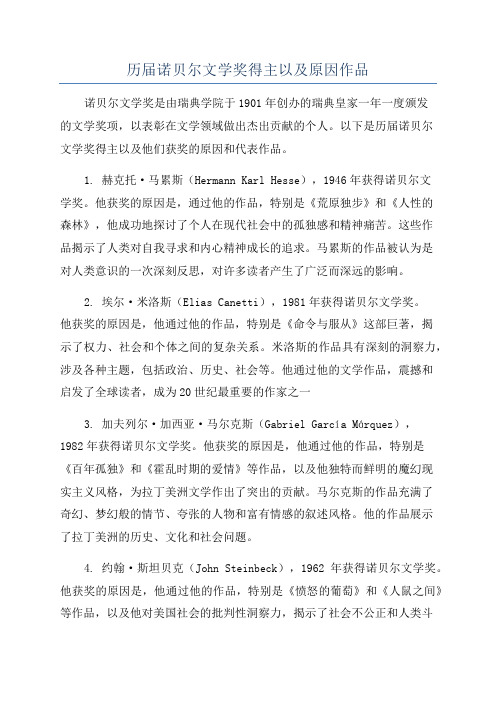
历届诺贝尔文学奖得主以及原因作品诺贝尔文学奖是由瑞典学院于1901年创办的瑞典皇家一年一度颁发的文学奖项,以表彰在文学领域做出杰出贡献的个人。
以下是历届诺贝尔文学奖得主以及他们获奖的原因和代表作品。
1. 赫克托·马累斯(Hermann Karl Hesse),1946年获得诺贝尔文学奖。
他获奖的原因是,通过他的作品,特别是《荒原独步》和《人性的森林》,他成功地探讨了个人在现代社会中的孤独感和精神痛苦。
这些作品揭示了人类对自我寻求和内心精神成长的追求。
马累斯的作品被认为是对人类意识的一次深刻反思,对许多读者产生了广泛而深远的影响。
2. 埃尔·米洛斯(Elias Canetti),1981年获得诺贝尔文学奖。
他获奖的原因是,他通过他的作品,特别是《命令与服从》这部巨著,揭示了权力、社会和个体之间的复杂关系。
米洛斯的作品具有深刻的洞察力,涉及各种主题,包括政治、历史、社会等。
他通过他的文学作品,震撼和启发了全球读者,成为20世纪最重要的作家之一3. 加夫列尔·加西亚·马尔克斯(Gabriel García Márquez),1982年获得诺贝尔文学奖。
他获奖的原因是,他通过他的作品,特别是《百年孤独》和《霍乱时期的爱情》等作品,以及他独特而鲜明的魔幻现实主义风格,为拉丁美洲文学作出了突出的贡献。
马尔克斯的作品充满了奇幻、梦幻般的情节、夸张的人物和富有情感的叙述风格。
他的作品展示了拉丁美洲的历史、文化和社会问题。
4. 约翰·斯坦贝克(John Steinbeck),1962年获得诺贝尔文学奖。
他获奖的原因是,他通过他的作品,特别是《愤怒的葡萄》和《人鼠之间》等作品,以及他对美国社会的批判性洞察力,揭示了社会不公正和人类斗争的主题。
斯坦贝克的作品普遍被认为是对人性的深刻审视,对美国文学产生了重要影响。
5. 托马斯·曼(Thomas Mann),1929年获得诺贝尔文学奖。
诺贝尔文学奖历年获奖作品

诺贝尔文学奖历年获奖作品诺贝尔文学奖是世界上最高荣誉的文学奖项,每年颁发给对人类文化做出杰出贡献的作家。
自1901年设立以来,已经有许多优秀的作品获得了这一荣誉。
本文将回顾历年获奖作品,并简要介绍它们的内容和影响。
1901年,第一届诺贝尔文学奖颁给了法国作家雷纳尔德·西蒙的作品《阿瑟·拉莫洛》。
这部小说描绘了一个被社会孤立的年轻人的故事,反映了19世纪末法国社会的道德和社会问题。
1907年,拉德亚德·基普林的小说《亚当·贝德》获得了诺贝尔文学奖。
这部作品以医生的视角展现了人类的道德困境和社会不公,并探讨了人类的存在意义和宗教信仰。
1922年,诺贝尔文学奖颁给了爱尔兰剧作家约翰·史特林的作品《维多利亚时代》。
这部剧作描述了一个贫穷的家庭在英国维多利亚时代的生活,揭示了社会阶级固化和道德沦丧的问题。
1949年,安德烈·纪德的小说《家庭》获得了诺贝尔文学奖。
这部作品通过描写一个家庭的故事,探讨了家庭关系、爱情和个人自由的主题,对苏联社会现实进行了深刻的批判。
1969年,萨缪尔·贝克特的剧作《等待戈多》获得诺贝尔文学奖。
这部作品以荒诞剧的形式,揭示了人类存在的无意义和孤独,对战后欧洲文学产生了深远的影响。
1982年,哥伦比亚作家加夫列尔·加西亚·马尔克斯的小说《百年孤独》获得了诺贝尔文学奖。
这部作品以魔幻现实主义的风格,讲述了布恩迪亚家族七代人的故事,探讨了拉美地区的历史、政治和人性的主题。
2008年,法国作家让-玛丽·古斯塔夫·勒克莱齐奥的小说《散兵游勇》获得了诺贝尔文学奖。
这部作品通过讲述一位法国军官在亚洲殖民地的经历,探讨了帝国主义和殖民主义的问题,并对人类的道德选择进行了深刻的思考。
2017年,英国作家卡齐姆·奥兰的小说《遗愿人》获得了诺贝尔文学奖。
这部作品以一个家庭三代人的故事,反映了英国社会的变迁和族群关系的问题,同时也探讨了人类的记忆和认同的主题。
历届诺贝尔文学奖得主回顾

历届诺贝尔文学奖得主回顾自1901年第一届诺贝尔文学奖颁发以来,这个另全世界瞻仰的奖项已经走过了111年的辉煌历程。
2012年诺贝尔文学奖将于10月11日颁发,下面就让我们先来一起来回顾一下往年诺贝尔文学奖的得主吧。
亨利克·显克维支(1846~1916)波兰小说家。
1905年作品《你去什么地方》获诺贝尔文学奖。
约瑟夫·鲁德亚德·吉卜林(1865~1936)英国小说家、诗人。
1907年作品《老虎!老虎!》获诺贝尔文学奖。
西尔玛·拉格洛夫(女)(1858~1940)瑞典作家。
1909年作品《骑鹅旅行记》获诺贝尔文学奖。
罗宾德拉纳特·泰戈尔(1861~1941)印度诗人、社会活动家主。
1913年作品《吉檀枷利—饥饿石头》获诺贝尔文学奖。
获奖理由:“由于他那至为敏锐、清新与优美的诗;这诗出之于高超的技巧,并由于他自己用英文表达出来,使他那充满诗意的思想业已成为西方文学的一部分”。
罗曼·罗兰(1866~1944)法国作家、音乐评论家。
1915年作品《约翰—克利斯朵夫》获诺贝尔文学奖。
克努特·汉姆生(1859~1952)挪威小说家、戏剧家、诗人。
1920年作品《大地硕果—畜牧曲》获诺贝尔文学奖。
乔治·萧伯纳(1856~1950)爱尔兰戏剧家。
共完成51个剧本。
主要作品有《圣女贞德》等。
1925年作品《圣女贞德》获诺贝尔文学奖。
亨利·柏格森(1859~1941)法国哲学家。
主要作品有《时间与自由意志》、《创造进化论》、《道德与宗教的两个起源》等。
1927年作品《创造进化论》获诺贝尔文学奖。
路伊吉·皮兰德娄(1867~1936)意大利说家、戏剧家。
一生创作了40多部剧本。
主要剧作有《诚实的快乐》、《六个寻找剧作者的角色》、《亨利四世》、《寻找自我》等。
1934年作品《寻找自我》获诺贝尔文学奖。
尤金·奥尼尔(1888~1953)美国剧作家。
诺贝尔文学奖历年名单及作品中国
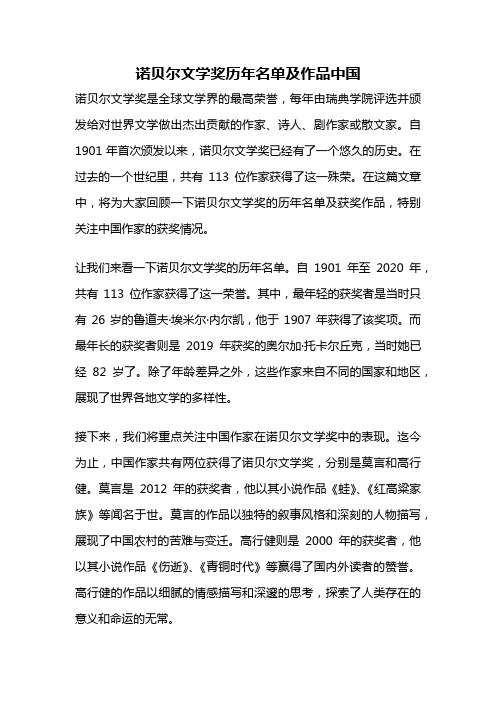
诺贝尔文学奖历年名单及作品中国诺贝尔文学奖是全球文学界的最高荣誉,每年由瑞典学院评选并颁发给对世界文学做出杰出贡献的作家、诗人、剧作家或散文家。
自1901年首次颁发以来,诺贝尔文学奖已经有了一个悠久的历史。
在过去的一个世纪里,共有113位作家获得了这一殊荣。
在这篇文章中,将为大家回顾一下诺贝尔文学奖的历年名单及获奖作品,特别关注中国作家的获奖情况。
让我们来看一下诺贝尔文学奖的历年名单。
自1901年至2020年,共有113位作家获得了这一荣誉。
其中,最年轻的获奖者是当时只有26岁的鲁道夫·埃米尔·内尔凯,他于1907年获得了该奖项。
而最年长的获奖者则是2019年获奖的奥尔加·托卡尔丘克,当时她已经82岁了。
除了年龄差异之外,这些作家来自不同的国家和地区,展现了世界各地文学的多样性。
接下来,我们将重点关注中国作家在诺贝尔文学奖中的表现。
迄今为止,中国作家共有两位获得了诺贝尔文学奖,分别是莫言和高行健。
莫言是2012年的获奖者,他以其小说作品《蛙》、《红高粱家族》等闻名于世。
莫言的作品以独特的叙事风格和深刻的人物描写,展现了中国农村的苦难与变迁。
高行健则是2000年的获奖者,他以其小说作品《伤逝》、《青铜时代》等赢得了国内外读者的赞誉。
高行健的作品以细腻的情感描写和深邃的思考,探索了人类存在的意义和命运的无常。
除了莫言和高行健,还有一些中国作家曾经被认为是有望获得诺贝尔文学奖的候选人。
例如,杨绛是中国文学界的重要人物,她的作品《红高粱》和《梦里花落知多少》等被誉为经典。
另外,王安忆、蒋捷、余华等作家也因其独特的创作风格和深刻的思想内涵而备受关注。
然而,尽管中国作家在世界文学舞台上取得了一定的成就,但在诺贝尔文学奖的评选中却一直没有再次获得荣誉。
这引发了一些争议和讨论。
有人认为,诺贝尔文学奖的评选标准存在一定的局限性,过多地关注了欧美文学,对其他地区的文学价值认知不足。
另外,一些人认为中国文学的特点与西方文学有所不同,其价值和影响也应该得到更多的认可。
诺贝尔文学奖历年名单及作品

诺贝尔文学奖历年名单及作品诺贝尔文学奖是自1901年创立以来最杰出的文学奖项之一,也是一项被认可的质量标准。
今天,这份领先的文学荣誉在海外已经闻名。
在有关诺贝尔文学奖的讨论中,人们往往会谈论历届获奖者以及作品。
本文将详细介绍诺贝尔文学奖历届获奖者及作品,供大家参考。
第一届诺贝尔文学奖的获奖者是英国的罗素布朗,他在1901年被授予此一荣誉。
他的作品主要集中在英国文学,法国文学,意大利文学和德国文学等方面。
他出版的作品《望明月》影响了英语文学,成为现代文学的典范。
第二届诺贝尔文学奖的获奖者是德国的卡尔马克思,他在1902年获得了这一荣誉。
他的主要作品有《资本论》、《共产党宣言》、《社会主义宣言》等。
他认为,人类只有在完全平等的条件下才能获得自由,这一理念对今天的世界仍有持久的影响力。
第三届诺贝尔文学奖的获奖者是俄国的尼古拉戈尔诺夫斯基,他在1903年获得了这一荣誉。
他的作品涉及早期对社会主义的质疑和反思,以及对6月失败议程事件的反思,其中包括《演讲词前》和《彼得和费奥多拉》等作品,为世界文学作出了重大贡献。
第四届诺贝尔文学奖的获奖者是美国的约翰伯恩斯,他在1904年获得了这一荣誉。
他的作品最受欢迎的是《艾瑞克米伦之死》,是一部关于一个农民因抗议土地征服制度而去世的书。
该作品引发了美国人民抗议土地征服制度的怒潮,这个抗争最终改变了美国的历史。
第五届诺贝尔文学奖的获奖者是塞内加尔的尼采道尔,他在1905年被授予此一荣誉。
他的最著名的作品是《穆斯林礼仪》,这部作品对世界文学有着重大的影响,从中可以看出他的宗教改革主义的思想。
这本书出版后,他的落日之前和落日之后在国际文坛上受到了广泛的赞誉。
第六届诺贝尔文学奖的获奖者是挪威的洛伦斯米勒,他在1906年被授予该荣誉。
他的作品主要是关于青少年的成长历程,其中包括《野生的泪珠》、《孩子们的玩具》等作品,这些作品描述了孩子们在成长过程中的心理发展。
第七届诺贝尔文学奖的获奖者是美国的史蒂文威尔斯,他在1907年被授予该荣誉。
浅谈诺贝尔文学奖的由来以及发展
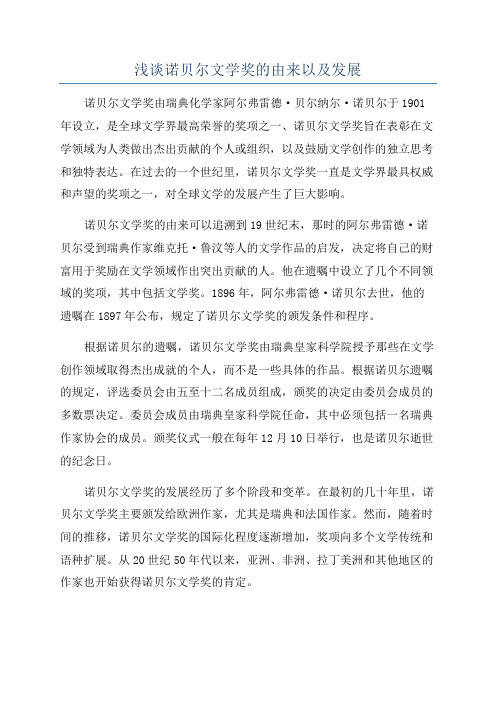
浅谈诺贝尔文学奖的由来以及发展诺贝尔文学奖由瑞典化学家阿尔弗雷德·贝尔纳尔·诺贝尔于1901年设立,是全球文学界最高荣誉的奖项之一、诺贝尔文学奖旨在表彰在文学领域为人类做出杰出贡献的个人或组织,以及鼓励文学创作的独立思考和独特表达。
在过去的一个世纪里,诺贝尔文学奖一直是文学界最具权威和声望的奖项之一,对全球文学的发展产生了巨大影响。
诺贝尔文学奖的由来可以追溯到19世纪末,那时的阿尔弗雷德·诺贝尔受到瑞典作家维克托·鲁汶等人的文学作品的启发,决定将自己的财富用于奖励在文学领域作出突出贡献的人。
他在遗嘱中设立了几个不同领域的奖项,其中包括文学奖。
1896年,阿尔弗雷德·诺贝尔去世,他的遗嘱在1897年公布,规定了诺贝尔文学奖的颁发条件和程序。
根据诺贝尔的遗嘱,诺贝尔文学奖由瑞典皇家科学院授予那些在文学创作领域取得杰出成就的个人,而不是一些具体的作品。
根据诺贝尔遗嘱的规定,评选委员会由五至十二名成员组成,颁奖的决定由委员会成员的多数票决定。
委员会成员由瑞典皇家科学院任命,其中必须包括一名瑞典作家协会的成员。
颁奖仪式一般在每年12月10日举行,也是诺贝尔逝世的纪念日。
诺贝尔文学奖的发展经历了多个阶段和变革。
在最初的几十年里,诺贝尔文学奖主要颁发给欧洲作家,尤其是瑞典和法国作家。
然而,随着时间的推移,诺贝尔文学奖的国际化程度逐渐增加,奖项向多个文学传统和语种扩展。
从20世纪50年代以来,亚洲、非洲、拉丁美洲和其他地区的作家也开始获得诺贝尔文学奖的肯定。
诺贝尔文学奖的颁发也不是一帆风顺的。
有时会涉及政治和争议因素,有些年份甚至因为委员会内部的争议而取消奖项。
例如,在2024年,由于瑞典学院陷入丑闻和分裂,诺贝尔文学奖宣布暂停一年。
此外,诺贝尔文学奖还引发了关于评选标准和偏见的争议,一些人认为有些文学作品被忽视或低估。
然而,无论争议或变革如何,诺贝尔文学奖仍然是世界文学的重要指标之一、它给予了被认为在文学领域做出杰出贡献的作家和作品全球范围内的认可和赞赏。
诺贝尔文学奖历届作品
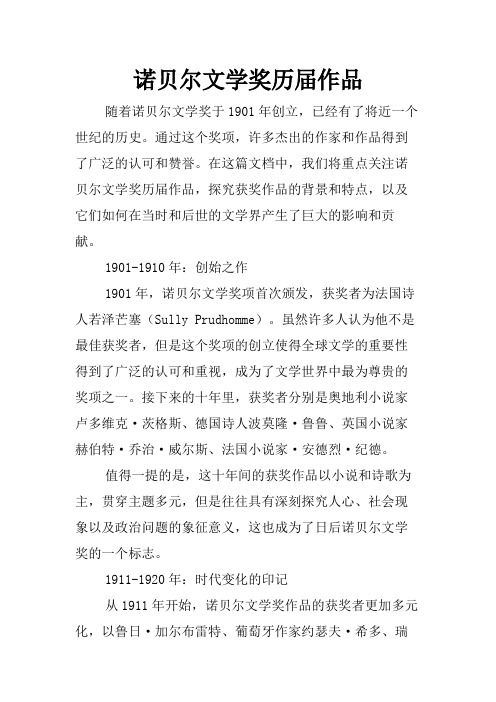
诺贝尔文学奖历届作品随着诺贝尔文学奖于1901年创立,已经有了将近一个世纪的历史。
通过这个奖项,许多杰出的作家和作品得到了广泛的认可和赞誉。
在这篇文档中,我们将重点关注诺贝尔文学奖历届作品,探究获奖作品的背景和特点,以及它们如何在当时和后世的文学界产生了巨大的影响和贡献。
1901-1910年:创始之作1901年,诺贝尔文学奖项首次颁发,获奖者为法国诗人若泽芒塞(Sully Prudhomme)。
虽然许多人认为他不是最佳获奖者,但是这个奖项的创立使得全球文学的重要性得到了广泛的认可和重视,成为了文学世界中最为尊贵的奖项之一。
接下来的十年里,获奖者分别是奥地利小说家卢多维克·茨格斯、德国诗人波莫隆·鲁鲁、英国小说家赫伯特·乔治·威尔斯、法国小说家·安德烈·纪德。
值得一提的是,这十年间的获奖作品以小说和诗歌为主,贯穿主题多元,但是往往具有深刻探究人心、社会现象以及政治问题的象征意义,这也成为了日后诺贝尔文学奖的一个标志。
1911-1920年:时代变化的印记从1911年开始,诺贝尔文学奖作品的获奖者更加多元化,以鲁日·加尔布雷特、葡萄牙作家约瑟夫·希多、瑞典女作家叶芝等人为代表的现代主义文学短暂崛起,其中叶芝获奖作品《诗的风景》至今还是获奖作品中最具代表性的诗集之一,探究了如何将个体主义和社会主义价值观完美结合,创作了糅合了现实主义和象征主义的诗歌风格。
而到了1915年,这个世界却大为变革,随着第一次世界大战的爆发,获奖作品也开始呈现一些不同寻常的主题和形式。
例如,罗曼·罗兰获奖作品《让·克里斯托弗》,在描述一位教师生涯的同时,也探寻了“个性中的共性”这一“人”所具有的共性和群体性问题。
此外,以东方文化为主题的许多几率作品(如李大钊等)也开始获得了更多的关注。
1921-1930年:大力推崇的“传奇诗人”1921年奖项首次颁发给北欧作家,其中著名的“传奇诗人”卡尔·古斯塔夫·维特斯(Karl Gustaf Verner von Heidenstam)就是其中之一。
- 1、下载文档前请自行甄别文档内容的完整性,平台不提供额外的编辑、内容补充、找答案等附加服务。
- 2、"仅部分预览"的文档,不可在线预览部分如存在完整性等问题,可反馈申请退款(可完整预览的文档不适用该条件!)。
- 3、如文档侵犯您的权益,请联系客服反馈,我们会尽快为您处理(人工客服工作时间:9:00-18:30)。
回眸百年诺贝尔文学奖
时间:2006年03月07日07:07 我来说两句(0)
搜索
精彩世界杯精彩进球视频
【来源:北青网—北京青年报】
诺贝尔奖已走过百年,中国人对它的争议与期待最终沉积成一个“情结”。
最新公布的一份调查报告以中国人的思维方式对诺贝尔文学奖提出了看法——谁是中国人心中当之无愧的桂冠作家、谁是诺贝尔文学奖永久的遗憾、诺贝尔文学奖对中国是否公正等等。
这份报告是由汪剑钊主编、南
海出版公司出版的《大师经典》
一书透露的,该书分上下两卷,根据调查结果选录了20位诺贝尔文学奖领衔作家和20位诺贝尔文学奖错失的文学大师的作品。
接受调查的有翻译家、学者、作家、诗人及北京大学、北京师范大学中文系的学生,以下是他们对此奖项的共识。
■领衔诺贝尔文学奖的20位作家
问卷结果表明,中国读者心目中威望最高的诺贝尔文学奖得主是:海明威、肖洛霍夫、马尔克斯、罗曼罗兰、帕斯捷尔纳克、萨特、贝克特、福克纳、托马斯曼、川端康成、叶芝、加缪、罗素、泰戈尔、黑塞、艾略特、萧伯纳、索尔仁尼琴、聂鲁达、蒲宁。
其中海明威以绝对优势名列榜首。
这表明,尽管人们已经肯定了诗人、小说家和戏剧家在创作中体现的探索性、前卫性,但作品主题的确定、内在的意韵和文字的信息层面,仍是打动读者的关键。
■诺贝尔文学奖错失的20位大师
这是中国人的“诺贝尔情结”充分流露的一面,榜上有名的是:鲁迅、卡夫卡、
乔伊斯、托尔斯泰、哈代、昆德拉、博尔赫斯、纳博科夫、易卜生、沈从文、普鲁斯特、契诃夫、里尔克、高尔基、老舍、左拉、瓦雷里、劳伦斯、曼杰什坦姆、阿赫玛托娃。
显然名列榜首的鲁迅在中国人的心中具有不可动摇的地位。
其实鲁迅在1927年得知自己获得诺贝尔文学奖提名时曾说:“诺贝尔赏金,梁启超自然不配,我也不配,要拿这钱,还欠努力……我觉得中国实在没有可得诺贝尔赏金的人。
”这句话包含着一名优秀作家的清醒与沉着。
■诺贝尔文学奖并不完全公正
关于奖项是否公正的问题,选择“说不清楚”的人最多,而其他选项中学者和作家组认为诺贝尔文学奖“公正”或者“基本公正”的人数要多于学生,由此说明学者和作家更为了解这个奖项的评选原则,看待这个奖项也就更为理性。
随后相呼应的调查问题也表明,人们认为地理因素和语言因素是影响评奖过程的最大因素。
由于评委会位于瑞典这一北欧国家,它不可避免地会寻求所谓的文化大国和经济强国的支持,也更加关注这些国家的文学作品,据说,委员会一位成员曾公然宣称“诺贝尔文学奖现在仍是一个西方的奖”。
■诺贝尔文学奖在推动世界文学发展进程
这又是一个很理性的结论。
尽管答卷者对诺贝尔文学奖所流露的欧美中心倾向感到强烈不满,但多数人仍是肯定了它的积极作用。
■小说占据世界文学的主流地位
此次调查中,人们从历年的获奖者中选出了20位进行排名,结果前10位的作家中,小说家占了绝对的优势,这再次说明了叙事文学在精神和文化传播中的优势。
而在大众阅读中,标志着高雅趣味的诗歌,仍然无法摆脱被冷落的境遇。
■文化趣味倾向西方标准和判断
通过调查,能看出绝大多数答卷者的阅读范围主要局限在西欧和美国作家身上,而对索因卡、杨森的获奖作品所知甚少。
这反映出我们在文化趣味上与所谓的文化大国趋同的趋向,对亚非文学的忽视则更为严重。
因此尽管许多人一直在责备欧美中心主义的文化霸权,但内心深处依然认可西方的判断和标准。
■男女在作品评判方面存在差异
在北师大的问卷中,川端康成成为最受喜爱的获奖者,而在其他群体中,川端康成的名次并不靠前。
究其原因,原来北师大的答卷者中只有5位是男性,因此女性读
者的评价标准占据了主要地位。
这跟川端康成善于用清丽的文字营造凄美的气氛有关。
